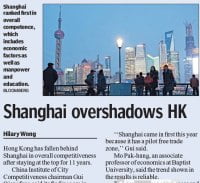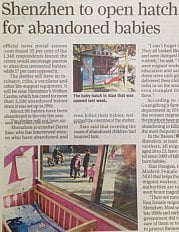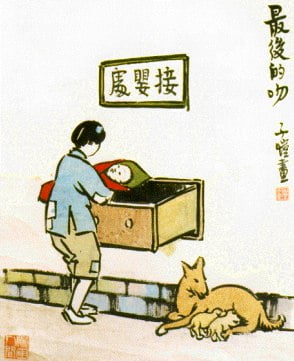Tiresome nonentities who produce trashy ‘surveys’ seem to go from strength to strength, churning out garbage labeled ‘data’ and getting gullible or desperate news media to take them seriously. Yesterday, it was accountants’ group CPA Australia announcing that three in 10 professionals in Hong Kong want to leave the city next year. By ‘professionals’, they presumably mean accountants and lawyers. We should be so lucky.
 Today, a rather more sinister-sounding outfit called the China Institute of City Competitiveness unveils its latest findings, which show that after 10 years at the top, Hong Kong has suddenly dropped to 11th place, leaving it behind Shanghai, Beijing, Shenzhen, Guangzhou, etc. The guy behind this fascinating research is one Gui Qiangfang. The methodology is a bit hazy, but (in case you run a city and want to know how it’s done) he says: “Shanghai came in first this year because it has a pilot free trade zone.”
Today, a rather more sinister-sounding outfit called the China Institute of City Competitiveness unveils its latest findings, which show that after 10 years at the top, Hong Kong has suddenly dropped to 11th place, leaving it behind Shanghai, Beijing, Shenzhen, Guangzhou, etc. The guy behind this fascinating research is one Gui Qiangfang. The methodology is a bit hazy, but (in case you run a city and want to know how it’s done) he says: “Shanghai came in first this year because it has a pilot free trade zone.”
On the face of it, the CICC looks like a sort of freelance patriotic PR campaign to bring Hong Kong down a peg or two. This would fit in with the official Mainland-endorsed narrative that started post-SARS, amplified by local government and media, about how the Big Lychee has no future role, will be overtaken by the inevitable Shanghai, must ‘integrate’, must be obedient/servile/grateful, and you know the rest.
But, sadly, Gui’s operation does not appear to be such a paragon of selfless, wholesome and nationalistic virtue. A few years back, the CICC named Beijing China’s most beautiful city, when any right-thinking person knows it is, mostly, aesthetically charmless if not plain ugly. And more recently a disillusioned CICC hanger-on from the University of Hong Kong denounced the outfit as dishonest.
Essentially, Gui Qiangfang (luxury apartment in Kowloon, and head of a rancid-sounding World Air Stewardess Association) becomes an ‘advisor’ to a city, and the city gets a high ranking. Thus, as the SCMP report says, some place called Jinhua (whaddya mean ‘where?’) is number-one for harmonious development, and the infamous sprawling ghost town of Ordos hilariously makes it into the five most ‘competitive for investment’.
On the subject of whores, what would be the ratio of Shanghainese hookers plying their trade in Hong Kong to Hong Kong prostitutes doing business in and around the Pearl of Pilot Free Trade Zones? Would this crude measure of where the money is prove a more accurate indicator of economic competitiveness than the CICC’s?
The South China Morning Post, to its credit, seems to have rumbled Gui and his Institute. It is China Daily, however, that inadvertently joins all the dots in this  deliciously tawdry saga. It’s got the lot: the obsession with fatuous rankings; the mutual shoe-shining and ‘cooperation’ and murky rewards; and the clumsy political propaganda to warn Hong Kong to choose between loyalty or decline. In this case, the ‘scholar’ warns about the Big Lychee’s cultural gap with the Mainland. You couldn’t make it up.
deliciously tawdry saga. It’s got the lot: the obsession with fatuous rankings; the mutual shoe-shining and ‘cooperation’ and murky rewards; and the clumsy political propaganda to warn Hong Kong to choose between loyalty or decline. In this case, the ‘scholar’ warns about the Big Lychee’s cultural gap with the Mainland. You couldn’t make it up.
Maybe if Hong Kong can’t catch up with Shanghai by scraping together a pilot free trade zone, it can always try to match Shenzhen – now 3rd in the list of Most Brilliant Chinese Cities in the Solar System – by having a competitive hatch for abandoned babies. You know you’ve really become a world-class city when you’ve got a baby hatch.
(Or – exciting update – maybe Hong Kong is still number-one. Depends whether you’re Swedish, perhaps.)


“On the subject of whores…”. Nice seque.
…looks like everyone’s watching Mandela’s funeral…
There will be lots of drinking…lots of grrrls…with Bill and Bono…and that Jive Turkey Obami…
…even the word…whore…doesn’t elicit much comment…
Better than throwing them out of high-rises, I suppose. But surely accessory to a crime, since giving birth is illegal for most women in China.
If the ‘Tibet’ in today’s title refers to Ordos, it is time for Hemlock to pull out his trusty little map of China. The old or new expanded version are both acceptable. The Ordos region is famous for wild horses, bactrian camels and goji berries (i.e., wolfberries that Mad Dog can throw at the CE instead of petrol bombs). It’s only investment attraction might be its fa-cai (hair vegetable) which we all here in Hong Kong eat at Chinese New Year time to make us think we might ‘strike it rich’ in the months ahead. Even the Dalai Lama in his most wistful moments does not demand the return of Ordos. It is in the desert region of southern Inner Mongolia far from the yaks, chiru antelope and high altitude deserts of the Tibetan Changtang. But never fear, in another few years when China’s railroad extends all the way to Katmandu in Nepal, it will be announced that Shigatse has surpassed Hong Kong as a communication and export hub.
Ordos is believed to have substantial oil and gas reserves, hence its claimed investment potential. That, plus the fact that any place with no investment at all as yet obviously has enormous potential for more.
Ordos – the ultimate ‘build it and they’ll come’ myth buster. And the city government doesn’t pay their advertising bills.
Tut tut Hemmers. You need to check your sources
But to be fair even the Sub-Standard got it wrong.
According to ever-correct Global Times HK has only been relegated to 2nd place after all-glorious-I’ve-gotta-baby-FTZ-Shanghai
” The institute….. relegated Hong Kong to second place for the first time in 11 years, primarily because Shanghai established a pilot free trade zone this year, according to the institute’s announcement”
Ah – that’s a blessing. Only 2nd place, not 11th.
We can sleep well again at night, knowing very well that SH will soon have to set up a baby-FTZ hatch.